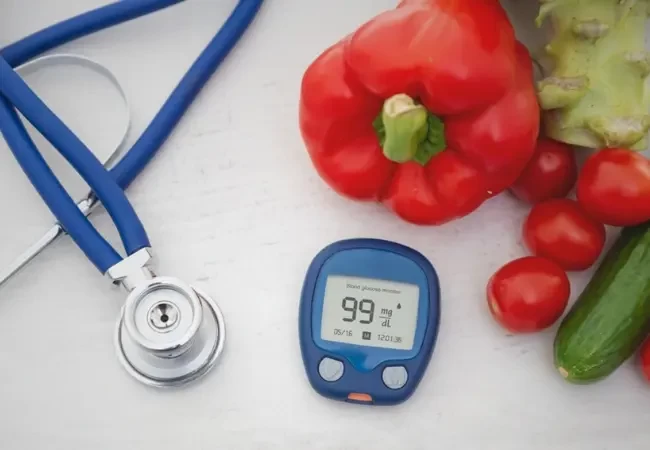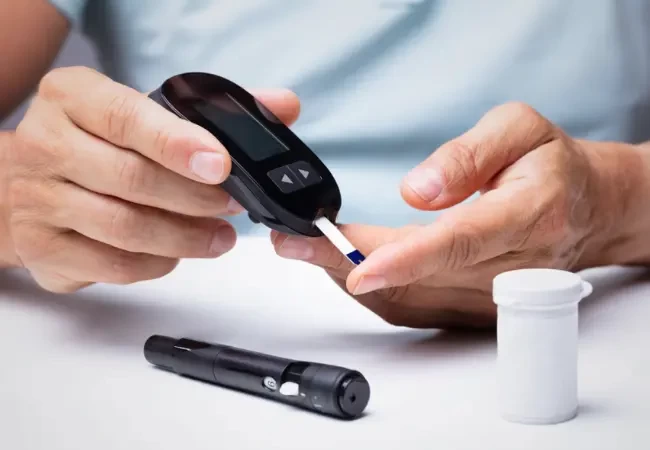Blog
Thyroid Nodules

How Common Are Thyroid Nodules?
 Medically reviewed by: Dr. Tom Babu, Consultant Diabetologist & Endocrinologist - Written by Riya Yacob - Updated on 26/11/2024
Medically reviewed by: Dr. Tom Babu, Consultant Diabetologist & Endocrinologist - Written by Riya Yacob - Updated on 26/11/2024In recent years, thyroid nodules or thyroid-related conditions have been reported more frequently. One of the main reasons for this surge in these cases is the growing awareness. People are more aware of these conditions and the importance of regular health checkups. Like earlier, people are not hesitant to undergo routine screenings and tests, including ultrasound scans and blood tests that will help detect these health conditions. In this blog, we discuss how common thyroid nodules are, their causes and the best thyroid nodule treatment.
Thyroid Nodules
Our thyroid gland is a small, butterfly-shaped endocrine gland situated in the anterior neck, inferior to the laryngeal prominence. The thyroid gland plays a significant role in regulating metabolism by producing two essential hormones thyroxine (T4) and triiodothyronine (T3). These hormones have a key role in many of our body functions including heart rate, metabolism, body temperature, pulse rate, digestion, etc.
Thyroid nodules are abnormal cellular growth that occurs on the thyroid gland. These growths can be solid or filled with fluid, and they can vary in size. While most thyroid nodules are benign, a small percentage can be cancerous. It is essential to have any detected nodules evaluated by a medical professional to determine the condition.
When it comes to thyroid nodules, they can be classified as solid, cystic (fluid-filled), multiple (several nodules), and solitary (single nodule). Remember, most thyroid nodules aren’t cancer. It can be a sign of thyroid disease and it is better to get the best thyroid nodule treatment.
Prevalence of Thyroid Nodule
Thyroid nodules are a common health issue affecting millions of people worldwide, especially women. A significant proportion of the population is affected by thyroid nodules at some point in their lives. Many studies have shown that up to 50% of the population may have thyroid nodules by the age of 60.
Causes and Effects
Thyroid nodules can even affect children. However, epidemiological data indicates that thyroid nodules are common among females, with a male-to-female ratio of approximately 1:4. Some of the thyroid nodules causes are as follows:
Iodine deficiency
Individuals residing in regions where iodine fortification of food is not practised have a higher chance of developing thyroid nodules. As an essential micronutrient, iodine is important for thyroid hormone synthesis. Iodine deficiency can contribute to the formation of thyroid nodules.
Thyroid Radiation
If you have exposure to thyroid radiation, there are chances it can lead to genetic mutations and damage to thyroid cells, causing thyroid nodules to form.
Age
As we age, our risk of developing thyroid nodules also increases. This is because the thyroid gland undergoes natural changes as we age, which can lead to the formation of nodules. One of the main reasons for this is the accumulation of genetic mutations over time, which can cause thyroid cells to grow abnormally.
Anaemia
You might already know that iron deficiency anaemia can disrupt thyroid function. There are chances for this to lead to an overproduction of thyroid-stimulating hormone (TSH) and the formation of thyroid nodules.
Smoking
Smoking is a significant risk factor for the development of thyroid nodules. Tobacco smoke contains numerous toxic chemicals that can damage the thyroid gland. It can reduce blood flow and oxygen delivery, leading to hypoxia and oxidative stress, which can cause nodules to form.
Obesity
Excess body fat can lead to chronic inflammation and oxidative stress, which can damage the thyroid gland and lead to the formation of thyroid nodules. If you have obesity, can also lead to insulin resistance and metabolic syndrome, which can lead to the development of thyroid nodules.
Metabolic Syndrome
Metabolic syndrome's chronic inflammation and oxidative stress can damage the thyroid gland.
Excessive Alcohol Consumption
There are chances for the thyroid gland to get damaged by excessive alcohol consumption by reducing blood flow and oxygen delivery.
Apart from these factors, increased insulin-like growth factor-1 levels, and the presence of uterine fibroids are also thyroid nodules causes.
Thyroid Nodule Treatment
Treatment for thyroid nodules depends on the type of nodule. As mentioned earlier in the blog, benign nodules are usually not cancerous and don't require surgery. Instead, they can be monitored with ultrasound over time. If the nodule grows, a repeat biopsy or surgery may be recommended.
In some cases, large benign nodules may be treated with radiofrequency ablation, a technique that uses heat to destroy the nodule. Some doctors may also recommend thyroid hormone medication to shrink the nodule, but this treatment is not always effective and may have side effects.
Malignant thyroid nodules are cancerous and require surgical removal of all or part of the thyroid gland. In some cases, additional treatments such as radioiodine therapy may be necessary. In some cases, thyroid nodule treatment may also involve taking thyroid hormone medication to replace the hormones that the thyroid gland normally produces.
The increased awareness among people has led to a surge in routine health checkups. As a result, ultrasound tests have become a standard part of these checkups. This increased use of ultrasound technology has enabled doctors to detect even small thyroid nodules, measuring less than 1 cm, with greater regularity. If you are looking for the best thyroid nodule treatment, Silverline Hospital can help.
As a highly specialized centre for Thyroid treatment in Kerala, we provide extensive care for all types of thyroid disorders. Our dedicated and qualified team of doctors stay updated in advanced medical technology and imaging techniques to provide the most effective treatment. For more information, get in touch with Silverline Hospital.

More Blogs
-

When Should Diabetics Eat? Expert Tips on Meal Timing and Blood Sugar Control
Learn how diabetics can optimize meal timing to better control blood sugar. Expert tips for healthier, more balanced living.
-

Facing the Fear: Understanding Psychological Erectile Dysfunction Before Marriage
Discover the causes and solutions for psychological erectile dysfunction before marriage. Gain insight, support, and confidence for a healthy relationship.
-

Why Overweight Individuals Should Embrace Early Dinners
Ready to lose weight smarter? See why early dinners are a game-changer for overweight individuals aiming for lasting health and weight control.
-

Overweight? Start with This One Powerful Lifestyle Change
Struggling with weight? Most of us eat our heaviest meal of the day at night, usually after 9 or even 10 PM.
-

How Blood Sugar Control Can Save Your Heart: What Every Diabetic Needs to Know
Blood Sugar Control & Heart Disease: What Diabetics Should K


 Home
Home  Booking
Booking
 Chat Now
Chat Now  Call Us
Call Us